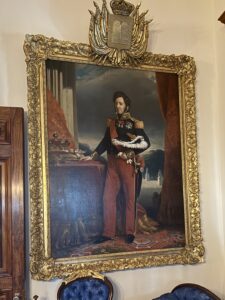OH Canada!
This week, Lynnda and I were in Toronto at the SelectUSA Canada Roadshow. The event is hosted by the U.S. Commerce Department Commercial Services to encourage direct foreign investment in the USA.
We had a business dinner in Morgantown last Friday with our friends from Israel who are looking for a location for their U.S. R&D Center. They flew home Saturday after a productive week and meetings with the governor, secretary of state, secretary of commerce and business leaders. The state people, business community and people of West Virginia were helpful and welcoming.
Hosting foreign and domestic companies when they visit our region, we find, visitors are always impressed by the friendliness and helpfulness of people throughout the region. It makes them want to return. Our people are an asset many times overlooked.
The other comment we hear is how green our region is. Visitors are surprised by our abundant forests. The Israelis were surprised by how easy it is to get around with few traffic jams.
On the way to Toronto, we took Saturday to visit family in Pittsburgh. Checking weather in Pittsburgh and Toronto, it looked like an easy trip. I was wrong.
We drove into lake effect snow in northwest Pennsylvania around Erie. Wind and rain turned into fog and blowing snow when the temperature dropped near freezing, covering road surfaces with snow. Driving into New York on I-90 the sun came out and travel got easier.
At the U.S. Canadian border, the major questions were; “What is the purpose of your visit? How long are you staying? Do you have any firearms?” The last question surprised me: “Do you have any alcohol?” I didn’t know, in response to the tariffs, Canada banned the sale of U.S. liquor. You can’t buy American bourbon or wine in Canada.
Compared to going overseas, driving in Canada felt like being in another state with a French flare. It was surprising how much traffic there was in Toronto on a Sunday afternoon.
While Lynnda slept after the long trip, I rewrote and rehearsed the six-minute presentation I would be giving the next morning to tell the story of the Shale Crescent USA region. It had to get the audience’s attention, be entertaining, informative and tell companies why they should locate in the Shale Crescent USA. Most important, we had to be memorable. The best facts are worthless if forgotten quickly. People remember stories. We all can recall a Bible story, like Noah and the Ark. It is thousands of years old. The closing story has to be powerful, summarize the presentation and be memorable. Several companies we met said, “Your presentation convinced us to meet with you.”
There were 14 economic development organizations attending, representing 16 different states. Shale Crescent represented Ohio, Pennsylvania and West Virginia. Each organization got to present its pitch and had its own private room to meet prospects. We heard messages from U.S. Ambassador to Canada Pete Hoekstra and Deputy U.S. Secretary of Commerce David Fogel, a CEO before taking his current position. What a novel idea – to put people in the Commerce Department who understand business rather than bureaucrats.
At the West Virginia Governor’s Energy Summit, we met with two young men in the U.S. Department of Energy about oil and gas in our region. Nathan, Shale Crescent’s president who had already met them, stopped me, “Greg, you don’t need to dumb it down for them. They are both petroleum engineers.” Wow, petroleum engineers in the Department of Energy; who would have thought? I hadn’t seen that in my 40-plus-year career in the energy industry. Washington is serious about economic development and producing economical energy.
Over 50 Canadian companies attended the Roadshow event looking to move manufacturing or expand to the USA where their customers are. Eight manufacturing companies scheduled meetings with us prior to the event. We were busy meeting over 20 companies and had serious discussions with 15. We considered nine of them to be leads. Five are strong leads.
One company visited the Shale Crescent to look at sites Friday following the event. They can be operational as early as this spring. We are scheduling follow-up calls with all prospects in the next two weeks because of their interest in our region.
Manufacturing companies we met are from the steel, automotive, chemical, medical and high-tech industries. All are currently exporting to the USA and see the advantages of manufacturing where their customers are. They see lower transportation and energy costs, less regulation and no tariffs to deal with as advantages to being in the USA.
In Canada, we saw gasoline prices at around $1.40 per liter, which is about a quart. We fueled in Toronto. It cost me $50 to fill my tank. When I returned to West Virginia, a fill-up of the same amount cost $25. With an advantageous exchange rate and lower fuel cost, Canadian companies can reduce energy cost significantly in the USA.
High energy costs hurt those with lower incomes most. Assuming a fill-up per week, a person in West Virginia saves $100 per month that goes back into the economy for goods and services. Energy cost affects the price of every product people buy. Canadian businesses can lower energy costs by locating in the USA.
We attended a Thanksgiving dinner put on by the Canadian-American Chamber. The Canadian Ambassador to the USA spoke about trade and tariff talks. She is optimistic they are close to a resolution. Most importantly, she echoed the feeling of everyone in the room – the USA and Canada are very much alike. We have similar values. It is imperative for the U.S. and Canada to work together in defense against Russia and China. We need to work together economically for a strong North America benefiting people in both countries.
Both countries have bountiful resources they can share. It makes sense to trade with our friends rather than those who would be our adversary.
Greg Kozera, gkozera@shalecrescentusa.com, is the director of marketing for Shale Crescent USA. He is a professional engineer with a masters in environmental engineering and over 40 years of experience in the energy industry. Greg is a leadership expert, high school soccer coach, professional speaker, author of four books and many published articles.


